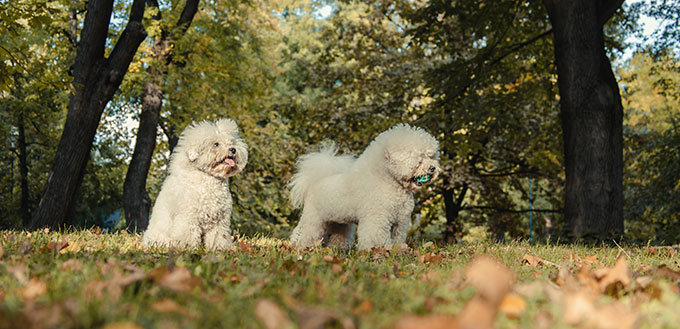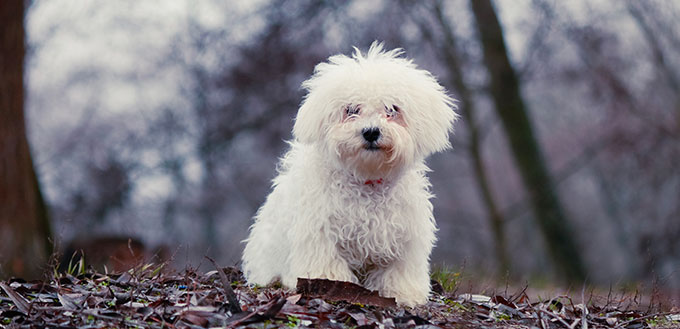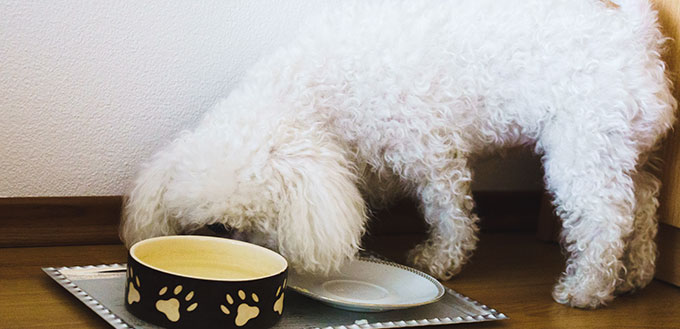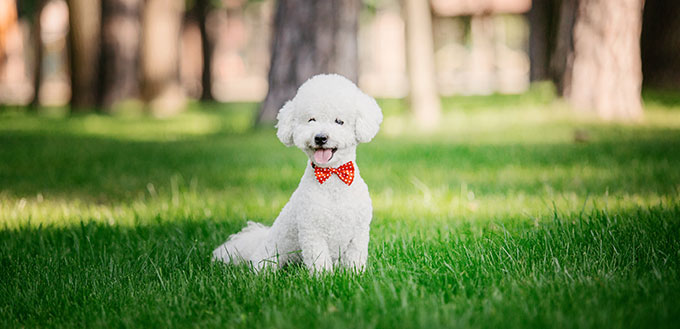With an irresistible white fluffy coat and a baby doll face, the Bichon Frise dog breed is one of the most adorable small dogs. This quirky character will soon win your heart and take over your home. They have a life span of around 15 years and will be your long term companion.
Your Bichon will like short bursts of exercise – they need about an hour a day. They will adapt to apartment living and, with the correct socialization, will live happily with children and other animals. Be prepared to put some work in when housebreaking them (it can take a long time) and when grooming to keep that gorgeous coat in the best condition. Check out our quick guide to this very special breed.
Breed Overview
| Dog Breed Group | Height | Weight | Lifespan |
|---|---|---|---|
| Classified by the American Kennel Club as being in the 'Non-sporting group' . It is also sometimes described as being part of the 'toy dogs' group but is not classed as a Toy Breed by the AKC. | 9.5-11.5 inches | 12-18 pounds | 14-15 years |
History of the Bichon Frise
Whilst the exact origin of the Bichon breed is not known, they certainly have a strong European and particularly French heritage. They have connections to the other Barbichon breeds namely the Bolognese, the Maltese and the Havanese. They all originate from the countries around the Mediterranean and they all have a similar appearance and character traits. It is thought that they may have originated from the Barbet, which is a wooly medium-sized, water dog.
The first records referring to the breed are from the 14th century. French sailors discovered the dogs on the Canary Island of Tenerife. These islands were on the important Phoenician trade route and the dogs had probably been brought there from Italy where they were bred originally.
However, another version of events is that Spanish sailors brought the Bichon to Tenerife in the 14th century and Italian traders brought them back to Europe. Then, when French soldiers invaded Italy in the 1500s, the dogs were taken back to France with them.
French Breeders have played a major role in the development of the breed. They became very popular amongst the French and English nobility and royalty. There are historical reports that King Henry III carried his Bichon dogs in a specially designed basket hanging from his neck. Bichons even feature in many paintings by the famous European painter Goya, who was a fan of the breed.
Sadly, they had slipped from favor by the end of the 1800s. They were regarded as a common dog and were owned by circuses and organ grinders to entertain crowds. They were also trained to lead blind people around. Thanks to their intelligence and adaptability, the breed survived this very difficult period in their history.
Following the First World War, French breeders started to take an interest in the breed once more and by 1933 an official breed standard had been devised by the Société Centrale Canine of France. It also received recognition by the Fédération Cynologique Internationale which is an international kennel club. This is when the name Bichon Frise was adopted. Originally it was Bichon à poil frisé which means a ‘Bichon with the curly coat’ but this was shortened to Bichon Frise.
The breed first arrived in the US in 1956. It was registered with the American Kennel Club Studbook in 1972 and became eligible to be shown in the Non-Sporting Group in 1973.
Few More Words About Bichon Frise
Lively, quirky and a born entertainer, your Bichon Frise will soon be your devoted companion. This breed has a lifespan of around 14 to 15 years.
They are a very adaptable dog and will adjust to most family situations. They are suitable pets for households with children and will even get on with cats if they are introduced to them at a young age. They do need to be socialized as young puppies or they may become too vocal when meeting new dogs.
Some would describe the breed as high maintenance – both from an attention and grooming point of view. Your Bichon will expect a lot of attention and have a tendency to suffer from separation anxiety. Even though they are low-shedding, their coat will require attention.
Bichon Frise Breed Appearance
The American Kennel Club breed standard for the Bichon Frise includes round eyes that are black or dark brown. They should be set in their skull and look directly forward. They should have black or very dark brown skin around the eyes which are called halos. They should have a soft and dense undercoat and a coarse and curly overcoat. It should be white in color but can have shadings of buff, cream or apricot. Both dogs and bitches should reach a height of between 9.5 inches and 11.5 inches.
In general, you can expect your Bichon Frise weight to be around 12 to 18 pounds when they are fully grown. You will need to keep an eye on their weight as they are prone to obesity. They have a compact body and a doll-like face that make a human’s heart melt!
Their coat is a medium length but is in a powder puff style – you will probably need the help of a professional groomer to keep it in order. It is bright white so look out for any staining issues.
Interesting Facts
Here are the top five interesting facts about Bichon Frises that you may not have known.
- The Bichon Frise may be a small dog but they are surprisingly fast! If your little pooch makes a run for it you are unlikely to be able to catch them unless you are also an excellent sprinter. Don’t let them off the leash until you are sure of your recall training.
- Bichons may not be the first dog that you associate with agility competitions but they can do very well at dog sports. The combination of loads of energy and their powerful desire to please their humans makes them respond well to the training and physical demands. In fact, it is very good for them and makes them less likely to nip and chew which can be caused by boredom.
- Bichons have a top coat that is a bit like curly wool. They also have an undercoat. Despite all of this hair, they are low shedders and will need to be clipped by a groomer on a regular basis.
- House training Bichons is not for the faint hearted! It will take a lot of time and a lot of work. Many owners decide to use crate training to help things along.
- Bichon Frises were bred as performing dogs in circuses and traveling shows. They will still love to delight their owners with their tricks and have a quirky personality. Your Bichon dog will love an audience!
Bichon Frise Temperament
The American Kennel Club describes Bichons as ‘lovers not fighters’ so if you are looking for a breed that makes great companion dogs, the Bichon could be right for you. They have quite high energy levels but they release that energy in bursts and then go back to being a calm and lovable dog.
These dogs will be an intelligent pet and take well to training. They are desperate to please their human family and will love to delight you with their latest tricks. Your Bichon will certainly alert you when someone enters your house but you cannot rely on them as a guard dog. They assume that all strangers are just friends that they have not yet met! The combination of their sociability, confidence and size makes them ideal city dogs and they are suited to apartment living. They will be a lively and quirky pet who is full of personality and will love cuddles.
There are downsides to their personality that you should bear in mind. Bichon Frises do not like to be left alone. This is a breed that suffers from separation anxiety and do best in households where there is usually someone at home. These dogs can also get snappy when they feel nervous so socialization is very important when they are young. Bichons do require a lot of attention and can be very vocal if they do not get it. Excessive barking can become a problem and is something that you may need to consult an expert about if it becomes a problem.
If you are looking for a water dog, this may not be the breed for you. Some Bichons will tolerate the water but most try to avoid it. If you are looking for a true water dog, you would be better off with a breed like the Water spaniel.
Bichon Frise Care
Training
When you get your new pet home, the training needs to begin. The pace of the training will be dictated by the breed type, age of the dog and the individual personality. The best way to ensure success when training is to attend puppy training classes and to socialize your new puppy. There is plenty of guidance available from the American Kennel Club and the Bichon Frise Club of America may also be able to help.
Bichons respond best to positive training approaches where they are rewarded with a treat or using a dog training clicker. Harsh and negative training methods do not work well. Some Bichons can be stubborn but should respond well to regular and consistent training.
When it comes to potty training, you may have a challenge on your hands with your Bichon Frise. You will need to be prepared for this to last a long time. Give your dog loads of praise when they potty in the garden and simply ignore indoor accidents. You will need to be very vigilant for many weeks.
Because potty training Bichon Frises is so difficult, you may want to use a crate training method. Many Bichons get along with this method. Your dog spends periods of time in their crate and is let out to potty in the garden, yard or wherever you want them to go. This can speed up the process and cut down on the mess that you have to clear up!
Feeding
A lot of new owners worry about what to feed their Bichon Frise. They will do well on any high quality food and this can be commercial dog food or one that you prepare at home. Bichons do like their food! This means that they can be prone to obesity caused by overeating. Your dog’s daily calorie consumption must be appropriate for their weight and age. Your vet can advise you further on this. Don’t forget that any teats that you give your Bichon Frise will need to be counted in their total calorie intake.
All dogs need a constant supply of clean and fresh water and should be able to drink as much water as they like. The Bichon Frise is no exception. Some dogs prefer ceramic or stainless steel drinking bowls to plastic ones.
Grooming
Bichons have a curly wool-like coat and a shorter undercoat. The hairs get trapped in the undercoat as they shed so they are considered a low shedding breed. However, they have quite high grooming requirements.
Before you invite a dog into your home, it is important that you are very aware of the grooming requirements for the individual breed. Bichon Frises are dogs that ideally need to be groomed every day. If you cannot manage daily grooming, then your grooming sessions should be at least every other day. Use a high quality brush and take your time. It is a good idea to get your pup used to grooming when they are young and then they will not mind it when they are older. With a bit of effort that wonderful coat will be in the best condition and you can share your adorable Bichon Frise pictures with all your followers.
They also need to be clipped once a month by a professional groomer. It is important that they are clipped correctly around the ears to let air circulate around them and reduce the risk of ear infections. Bichons also need a monthly bath. Only use a special dog shampoo and make sure that it does not go in their eyes.
The grooming regime should include regular nail clipping. You can do this yourself or you can ask your groomer to do it. Again, get your pooch used to the nail clippers when they are young and research how to do it correctly before you start.
Take a look at some of our dog grooming guides, such as the best dog dryer, best dog shampoo for puppies, best dog shedding brush, and best bath tubs for dogs.
Health
You can expect your little pet to have a life expectancy of around 15 years and most dogs will live happily and healthily into old age. However, there are certain health conditions and diseases that you should be aware of.
Dental disease is a common issue among dogs and unfortunately, the Bichon is more prone to this disease than many other breeds. Tartar builds up on the teeth and as bacteria start to attack the gums, gum disease can set in. Your pet can end up losing teeth and even developing kidney problems, liver problems, and heart or joint problems. It can reduce the length of your pet’s life by three years so it is not a trivial matter. You can help to prevent these diseases by cleaning your dog’s teeth regularly.
Your pet can also suffer from the usual canine infections including parvo, distemper and rabies. Most of these diseases can be prevented by vaccination so speak to your vet about this.
Obesity is an issue that you will have to watch out for in this breed. It can cause a raft of associated health issues including joint problems and heart disease. It also puts a lot of strain on the joints. Your vet can check if your pet is overweight and can advise you on a weight loss program. It is best not to feed these dogs human food and to make sure that they get plenty of exercise.
All dogs can suffer from a range of parasites including fleas, ticks, ear mites and worms. A suitable preventive medication will help to protect your dog from the pain and discomfort that they cause.
Genetic Predispositions
Many breeds of dogs have certain diseases to which they are prone because of their genetic make up. Here are the main ones that you should be aware of with the Bichon Frise.
- Bladder stones and kidney stones: Several different types of stones can form in the bladder and kidney. They are painful for the dog and you may notice blood in their urine. They may also appear to be straining to urinate. Stones can be diagnosed by tests carried out by your vet who can also advise on treatment.
- Legg Calve Perthes Disease: This is a degenerative hip condition that is very painful and arises in dogs that are between six and nine months old. The head of the thigh bone becomes brittle and can fracture easily. Your dog will become lame and will probably need surgery.
- Diabetes mellitus: This disease can affect all dogs but is more common in this breed. It affects the blood sugar levels and is a serious disease that requires daily injections of insulin. It can cause an increase in eating and drinking and weight loss. It needs to be diagnosed by a vet but can be managed very successfully in canines.
- Heart disease: Bichons are sadly prone to many types of heart disease including Patent Ductus arteriosis which is a problem with one of the small vessels of the heart. Fluid builds up in the lungs and puts a strain on the heart. A dog with this condition will appear breathless and weak. Extensive tests will be needed to make a diagnosis. Surgery may be required.
- Liver problems: Bichons are prone to a type of liver disease called portosystemic shunt (PSS). The blood supply to the liver is poor and it cannot function correctly. As a result, toxins can build up in the bloodstream. Your dog may need a special diet or medication and some will require surgery.
Exercising
Bichons prefer their exercise to be in short, sharp bursts. This suits them better than very long walks. In between these bursts of energy, Bichons will be relatively calm. They will love to have a pooch pal to go on walks with but will also enjoy a zoom around the garden or yard with their human family. They need play sessions as well as exercise to keep their mind occupied as well as their body.
You can take part in various dog sports with Bichons. They can do very well in dog agility and rally competitions.
Adopt Don’t Shop (Rescue Groups)
Many people feel that the ethical way to get your Bichon Frise is to visit a rescue group or animal shelter. The Bichon Frise dog breed (and crossbreeds derived from the Bichon) are often available in Dog Rescue groups. They are often given up by owners because they could not cope with the daily brushing requirements or because they found it too hard to house train them. The other traits that can cause problems are excessive barking or separation anxiety meaning that the dog could not be left alone. Some adoption Bichon Frises have behavioral issues but others have been put up for adoption simply because of a change in family circumstances and will make lovely pets.
Beware that some adoption centers will label all small fluffy white dogs as Bichon Frises so you may not actually be getting a purebred pet. Often members of the official Bichon Frise rescue groups will browse shelters regularly and try to move any Bichon Frises that they find into their own rescue networks.
Reputable Breeders
Pick your Bichon from an experienced and reputable breeder. You could get advice from organizations such as the Bichon Frise Club of America or the American Kennel Club. Ask if you can see their pet parents and check out reviews of the breeding practices.
There should be no health concerns about the pup. Look at their eyes, coat, and ears. If you want them to meet the breed standard (if you want to show them or breed from them) then you should also check that out. The puppy should not have any signs of a cough or a tummy upset. They should not have an unpleasant odor. Also, the pup should be playing happily with their brothers or sisters. The breeder should be happy to provide copies of certificates on request.
Price
Bichon Frise puppies are very popular – this breed is considered one of the accessory dog breeds. There is a lot of hype surrounding them and that drives up the price. You can expect to pay between $700 to $2000. Accredited breeders will charge more and you will have to pay a higher price for a more purebred dog. Home breeders of Bichon Frises may charge less but will not be as knowledgeable.
FAQs:
Q: Do Bichon Frise make good house dogs?
A: This is a small dog breed and even a full grown Bichon Frise is still a small dog! This makes them suitable as a house dog – and they will be quite happy with apartment living. However, watch out for their energy level. Make sure that you understand their exercise requirements before making a commitment. Bichons like to learn new tricks and play games.
Q: Do Bichon Frise get tear stains?
A: All white dogs can develop unsightly tear stains. These can occur between the toes and around the muzzle as well as under the eyes. This white coat staining can be a sign of health issues so it would be worth getting it checked out by your vet.
You can help by adopting good coat grooming practices and paying attention to eye and mouth hygiene. If you need further advice, contact an experienced dog groomer for help.
Q: Are Bichon Frise hypoallergenic?
A: Many experts feel that there is no such thing as a totally hypoallergenic dog. All dogs will drool and shed to some degree. However, as it is usually the saliva, hair and dander (skin flakes) that triggers allergies in humans, the less of these that a dog produces, the better.
In general, the Bichon Frise does not drool a lot and does not shed a lot of hair. This makes them suitable pets for most people with allergies. However, if a member of the family suffers from severe allergies you should be cautious.
Q: Should I get a male or female Bichon Frise?
A: If you think that you may want to breed from your Bichon Frise then you may prefer to have a female Bichon puppy and then you will be in control of any litter that they produce. If you are not breeding, the choice of gender is an entirely personal one. However, many owners feel that the males are more likely to climb onto your lap for a cuddle – a true lap dog. The females may be a little more aloof – but each dog has their own personality.
Q: Where does the Bichon Frise rank?
A: The Bichon Frise is described by the American Kennel Club as being ‘among the world’s great personality dogs’. The breed ranks at position 45 out of the 196 most popular breeds in the US in 2020. They are more popular than the Pekingese and the Papillon.
Sources:
- Joanna Ehlers, What Dogs Were Bred to Make a Bichon Frise?, The Nest
- Bichon Frise, VCA Hospitals
- J. Penderis, Dyskinesia In An Adult Bichon Frise, Wiley Online Library












My bichon will not step down on back leg was fine yesterday
My bich Frise wount step down on backeg